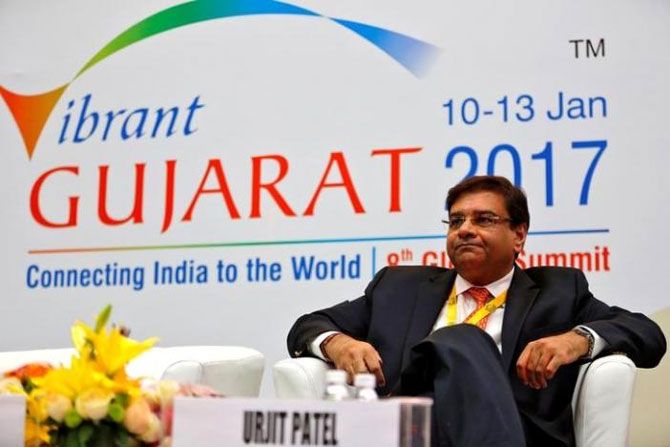Patel urges government to rein in borrowings, inflation

Ahead of the Union Budget, Reserve Bank Governor Urjit Patel, on Wednesday, urged the government to take steps to cut high central and state borrowings, saying India needs to ensure "good policy housekeeping" for stable macroeconomic conditions.
Speaking at the Vibrant Gujarat Global Summit in Gandhinagar, he underlined the need for also ensuring that the medium-term consumer-price based inflation target of 4 per cent was "secured on a durable basis".
At the same time, he said RBI would continue to press ahead with a "fluid transmission" of monetary policy and wanted the government to infuse adequate capital in the banking system.
The environment of macroeconomic stability built over the last few years must not be frittered away, Patel said.
The government debt-to-GDP ratio was taking its toll on the country's sovereign ratings, he said, adding that the combined fiscal deficit of the Centre and state governments was among the highest in the G20 group of nations.
"We have to take cognisance of these comparisons and facts as we go forward to make progress. Specifically, this will help us to better manage risks for ourselves and thereby mitigate financial volatility," he said.
The RBI Governor's comments come three weeks ahead of Finance Minister Arun Jaitley presenting the Budget on February 1, wherein he is likely to outline the fiscal deficit target for 2017-18 along with other policy and tax announcements.
For the current fiscal, a 6.4 per cent combined central and state fiscal deficit is being targeted.
Patel said the government needs to be mindful of subsidising credit or providing credit guarantees, saying such schemes can add to government debt.
"While some government guarantees and limited subventions can help, steep interest rate subventions and large credit guarantees also impede optimal allocation of financial resources and increases moral hazard," he said.
Patel stressed that keeping inflation low on durable basis is "essential prerequisite" for meaningful interest rate structure to increase investments for better growth.
"For us, in India, good policy housekeeping should be the cornerstone. It is easy and quick to fritter away gains regarding macroeconomic stability. But hard and slow to regain them," he said.
Under the new monetary policy framework, RBI is now tasked with a notified target for retail inflation of 4 per cent (plus or minus 2 per cent).
"Low and stable inflation is an essential prerequisite for having a meaningful interest rate structure or regime whereby decisions by savers and investors help to achieve maximal allocative efficiency in an economy whose investment rate has to increase for better growth outcomes," he said.
Alongside with keeping a tab on inflation, RBI continues to press for smoother transmission of monetary policy, he said.





